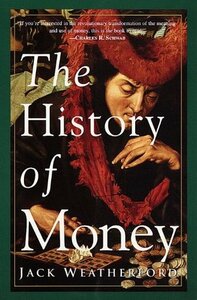Take a photo of a barcode or cover
I started reading this book last summer, then misplaced it for quite a while. It took me a while to get back into it. It is the kind of book to read in one or two sittings, not ten minutes before I fall asleep. It is not a difficult read, but it kind of whips through history, so I needed to pay attention in a mindful way. What is the point of reading a book like this if I am not going to learn anything that sticks?
The book started off pretty strong in tackling such a wide spread topic. Keeping things simple, we track the big eras of money, pre-coins, coins, paper...There are some fascinating descriptions of pre money. Norwegians trading with butter, for example. Also, there are all sorts of great vocabulary tales: the earliest currencies were things like salt (salary) and cattle (chattel).
Humans figure out it is simpler to have one standard piece and we get coins as currency. But, coins are heavy and can be stolen, so a better way to handle them is the bill of exchange, which brings us into the era of paper money. This aligns with the end of the European Middle ages--a society organized by heredity becomes organized by money.
I guess I knew cash was an old way of doing business, but the author leaves me hanging with the next big stage, our electronic age. Virtual money has detachment from a single government, and back in 1997 when the book was written,that might have been insight enough.
So, this is a good book overall. Whil the dollar is on it's decline, that is quite a ways off, and the author is not really concerned. His point is more that the dollar will go the way of the shell, but it will be not the end of money. I should not complain. The title is history of money, not the future of money.
The chapters on how governments (monarchies mostly) in the 17th to 19th centuries were unable to control money (they didnt understand that adding more money supply wouldnt increase their wealth and would cause inflation) was quite fascinating. Living in a post-economics world, these concepts seem so self-evident but really they are quite new. Interesting to see how the human race learns through its history.
Never thought about how the form of money could affect the economy - with money that didnt need to be tied to goods, the same money could be used multiple times by different people, generating more economic activity.
Quite impressed how the author predicted how we’d be using electronic money (this was written in the 1990s).
Thought the analysis was a bit eurocentric.
The narrative does get draggged down a bit in the last ~10% of the book though, once it starts predicting the future and talking about the morality of monetary policies...



